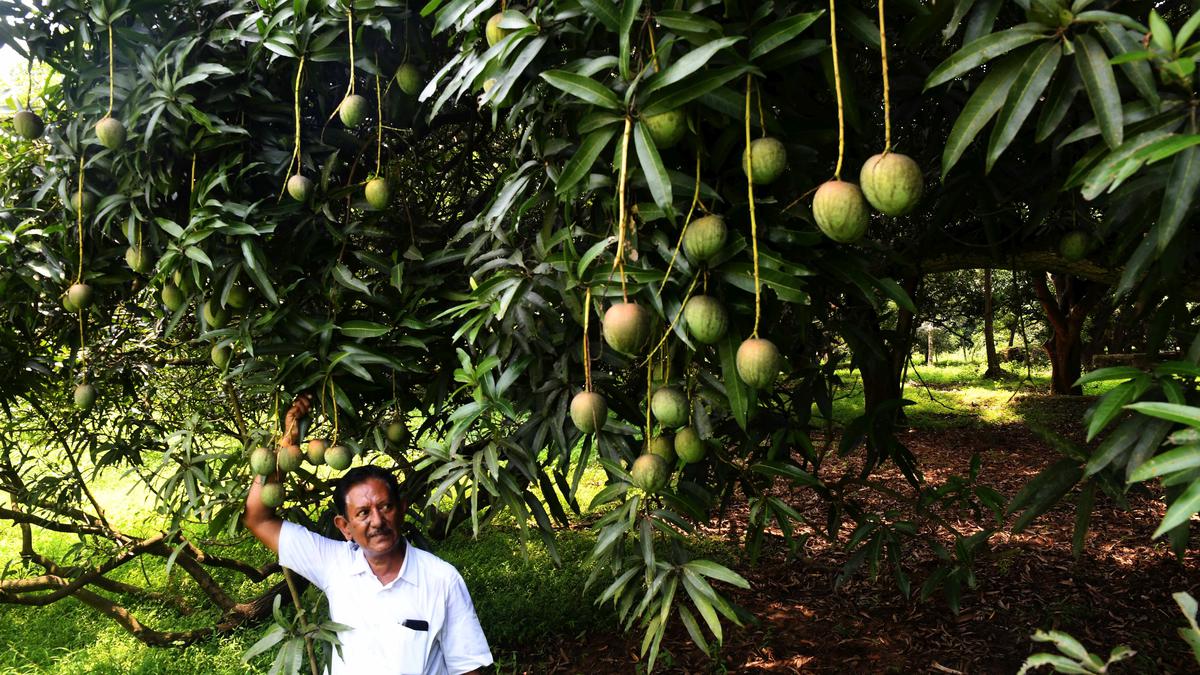
Is the Rajapalayam sappattai the tastiest mango of all time?
The Hindu
A visit to KS Jaganatha Raja’s mango farm at Rajapalayam
A mango that looks like an apple. A variety that tastes of palm jaggery. A giant of a fruit that is shamefully bland. One that is as long as an adult male’s arm. There are surprises at every turn in KS Jaganatha Raja’s mango orchard spread across 12 acres near the foothills of the Western Ghats at Rajapalayam, 90 kilometres from Madurai. The 67-year-old is showing us around during the peak season as the region’s prized possessions: the sappattai and panjavarnam are ready to be picked and transported to markets in the region.
We leave behind a dusty highway and walk into a small dirt road that passes through a trickling mountain stream. “This farm belonged to my forefathers,” says Jaganatha, leading us into his orchard that is home to around 300 trees, many of which are over 100 years old, standing 60 to 70 feet tall. “The trees benefit from the natural ground water, rich soil, and weather, thanks to their location,” he explains. Jaganatha is not your average mango farmer. He does grow the fruit for commercial purposes, but in between the trees that yield sought-after varieties, are gems that Jaganatha carefully preserves.
Such as the puliyadi or Mohandas, that tastes like the alphonso; the kathemar that looks like a gigantic boulder weighing over two kilograms each; the kovangachi that is best consumed by biting off a tiny bit of skin and drinking its syrupy juice; the theeyamavadi that has the texture and crunch of an apple when unripe. These are varieties that Jaganatha tracked down over years of searching. With just one or two trees each, their fruits are treasures that he shares with very few other than his close family.
“It’s a shame if a mango variety that we once enjoyed, becomes extinct, isn’t it?” he asks. “I do this because I want the future generations to know that such mangoes existed in our land.” While Jaganatha sells mango saplings through the year that he propagates through the grafting technique in his farm at his nursery in Rajapalayam, he is constantly on the lookout for rare mango varieties to revive.
“I am next set to graft the katladi; I have located a tree. The fruit tastes extraordinary,” he says, walking into a spread of trees under which a group of contractors harvests panjavarnam mangoes. Men collect the small fruit using a long stick that has a sickle tied to its head, and another one that has a cloth pouch tied to it, into which the fruit falls. “A mango that falls to the ground does not ripen evenly,” says Jaganatha, pointing to straw-filled sacks on to which the men drop the fruit from atop trees. “These offer a cushioning effect.” A truck awaits and two men tip cartons filled with the fruit into them. The smell of mangoes being harvested is quite unlike what we associate with the fruit; this is more earthy and raw, think crushed mango leaves and rain.
“It has been 30 years since I started my nursery,” says Jaganatha, adding that today, he has customers across India. He has supplied saplings to several farmers in the region whose red soil, Jaganatha says, is perfect for mango. “Mangoes that grow in red soil are the tastiest,” he feels. Which is why sappattai and panjavarnam are sought-after among people who know their fruit. Jaganatha’s vote, is for the latter. “Panjavarnam is the greatest mango of all time,” he feels.
But we are here for the sappattai. Can we taste them yet? “You will have to wait for 10 more days,” chuckles Jaganatha. “Only then will they have achieved their full growth.” He offers us a few to take back home, that at the time of writing, are still unripe. Meanwhile, Muthu, a farmhand, hands us mild-yellow slivers of a sappatai that he picked. It is crunchy like raw guava, has the texture of apple, tastes of mango, but is far from tart. Sappattai, we realise, is delicious, in any form.













